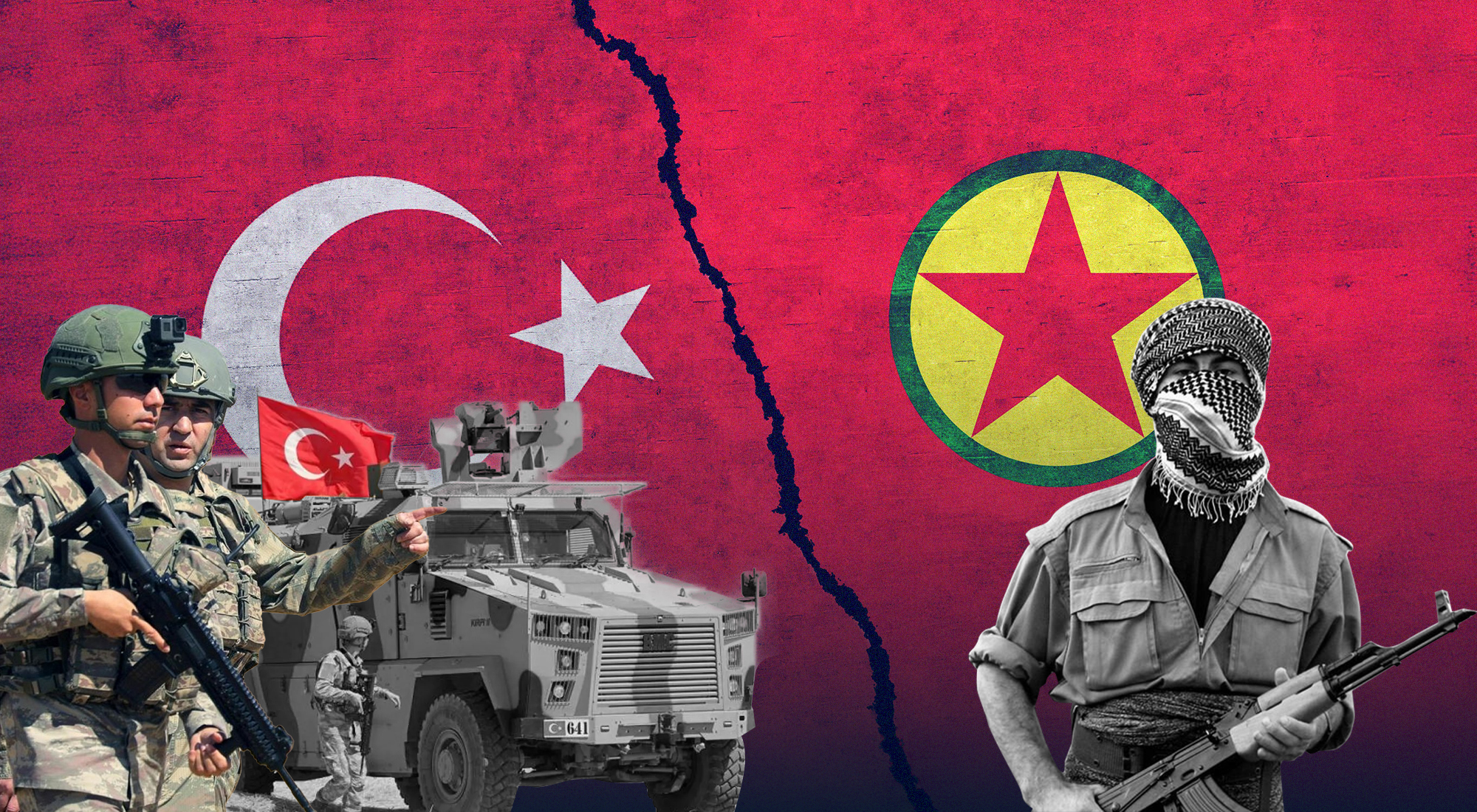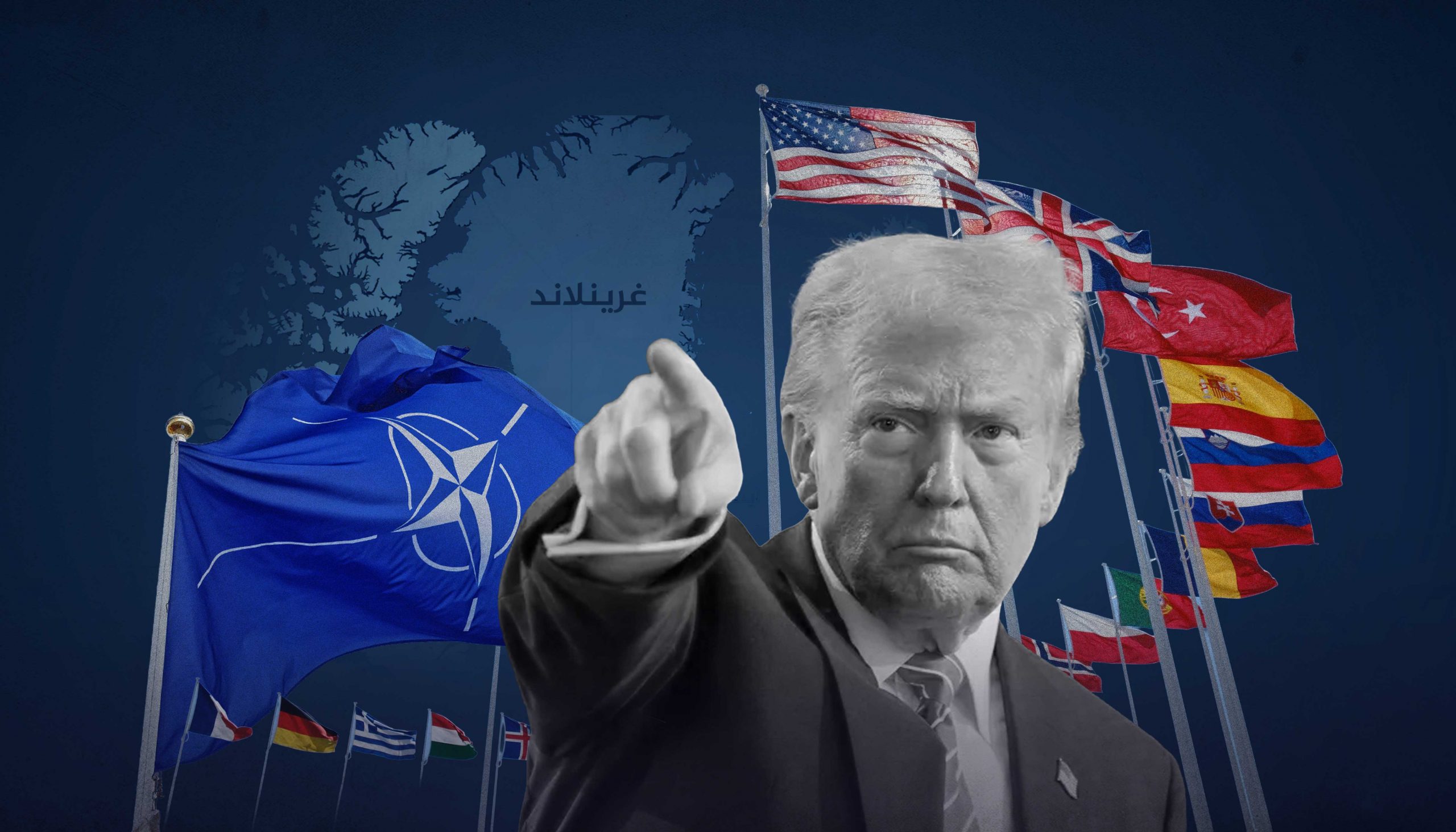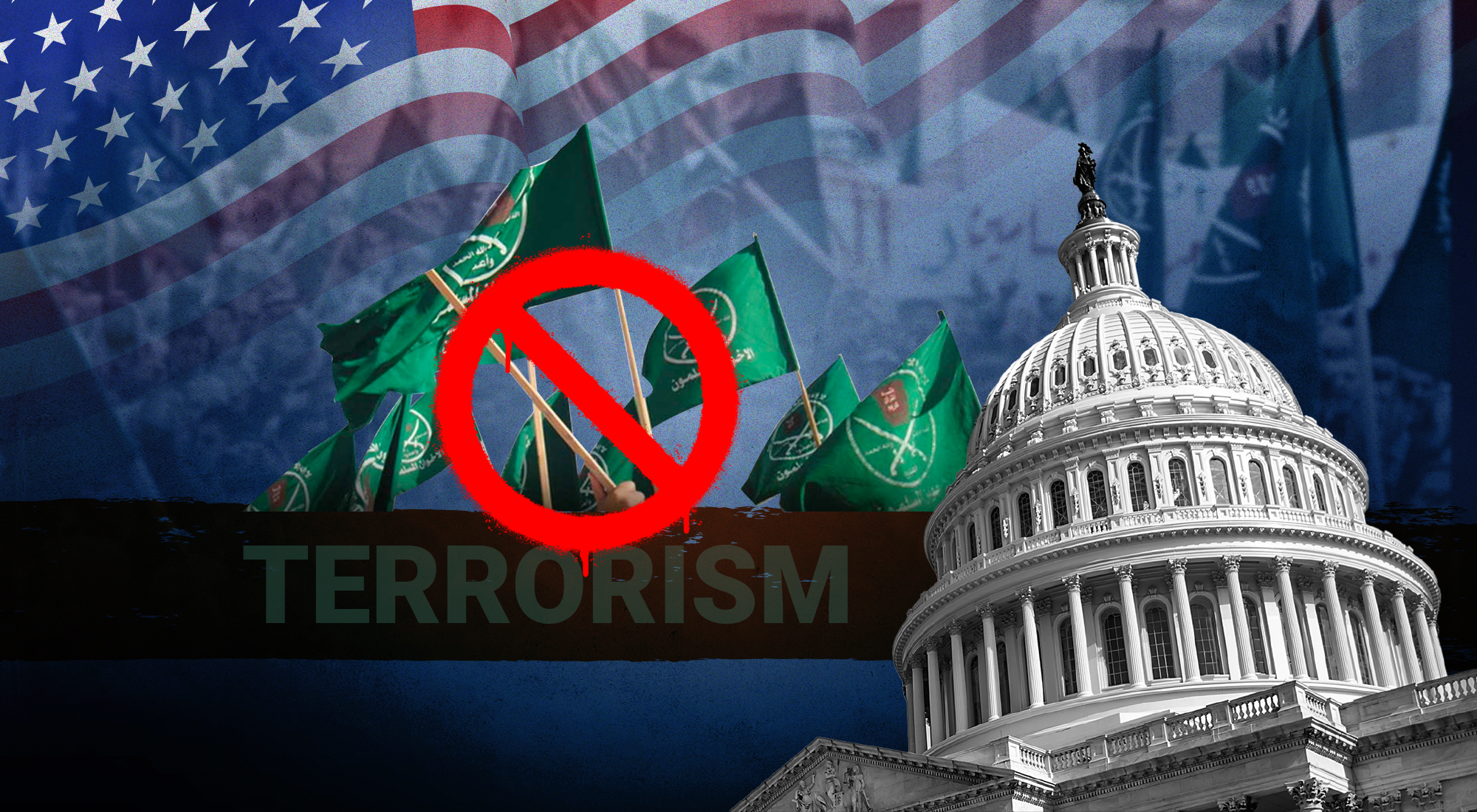Recent months have seen increased interest from Türkiye in the Kurdish geopolitical space. Türkiye is already an influential actor in northern Iraq’s Kurdish autonomous region, where it has developed a close working relationship with the Erbil government, building on over two decades of continuous ties and significant Turkish commercial activity within the Kurdistan Regional Government (KRG). Recently, the relationship has benefited from discussions on the “Development Road” project, which seeks to bridge the governments in Ankara, Erbil, and Baghdad, further binding them through a multibillion-dollar infrastructure framework, making Iraq a hub for regional trade.
While discussions on the “Development Road” continue, Türkiye’s interest has focused on the outlawed Kurdistan Workers Party’s (PKK) presence in Iraq, which is seen as the most significant obstacle to the project’s expected success. Türkiye’s recent security cooperation with Iraq’s central government has provided significant policy space for Ankara, as evidenced by discussions of a large-scale military deployment to Iraq over the past year. Although this deployment has yet to materialize, the topic has remained on the executive agenda.
Türkiye has also been cautious of a potential regional escalation, with tensions between Iran and Israel escalating since Hamas’s attack on Israel on October 7 and Israel’s subsequent invasion of the Gaza Strip. Türkiye has consistently maintained a pro-Gaza stance, severing ties with Israel by recalling its ambassador in Tel Aviv and imposing a ban on all Israeli-origin trade. The recent Israeli retaliation against Iran has been particularly concerning, with the risk of a far broader regional war looming.
While Türkiye and Gulf Cooperation Council (GCC) member states have sought to de-escalate tensions, both Iran and Israel have continued on paths of escalation. The risk of regional war has made the Kurdish geopolitical space an area of interest to several parties, including Türkiye.
Media speculation has suggested that Türkiye’s officials are wary of an imminent Israeli strike on Iran, which could destabilize the region and create a plethora of challenges for Türkiye in its aftermath.[1] Türkiye and Iran share a border of over 534 kilometers (332 miles), with the area often utilized by human trafficking networks and illicit migrant movements. Iran is also home to a significant Kurdish minority, similar to Türkiye. The PKK has been known to operate in Iran under different designations, such as PJAK.
Various reports from the region suggest that recent discussions in Türkiye about renewing a political track on negotiations with the PKK, and incorporating these talks broadly with members of the party representing the separatist Kurdish political movement in Türkiye, are directly linked to geopolitical calculations. These include limiting malign Israeli influence over Kurdish actors across the Middle East and maintaining security and stability in Kurdish-majority regions if a regional war breaks out.
This article examines Türkiye’s evolving strategy on the PKK. It considers Ankara’s security rationale in Iraq and Syria, expected policy shifts on U.S. support for the Syrian Democratic Forces (SDF)—which are comprised of the PKK affiliate People’s Defense Units (YPG)—and recent discussions on a renewed political track in negotiations with the PKK, reflecting Türkiye’s broader position on Kurdish separatism. Türkiye’s multifaceted outreach to the Kurdish geopolitical space remains central to regional power dynamics, with repercussions for Israeli and Iranian influence, as both actors continue vying for sway over various Kurdish groups across Iraq and Syria.
Kurdish Opening 2.0?
President Recep Tayyip Erdoğan’s longstanding electoral ally, Devlet Bahçeli,[2] leader of the mainstream Turkish nationalist movement and the Nationalist Movement Party (MHP), sparked discussions on a renewed political track with the PKK in a parliamentary address in late October. In a surprising proclamation, Bahçeli invited the PKK’s jailed leader, Abdullah Öcalan, to address the Turkish Parliament and called on the PKK to lay down arms and pursue negotiations on Türkiye’s longstanding Kurdish Question. The nationalist leader has since reiterated his call on several occasions, receiving mixed reactions. President Erdoğan has described Bahçeli’s address as “brave” but has refrained from officially endorsing a political track for negotiations with the Kurdish political movement, and by extension, the PKK.
Despite Bahçeli’s efforts to set a tone conducive to reconciliation between the Kurdish political movement and the government, the situation remains complex and nuanced.[3] Following Bahçeli’s address, the Ankara headquarters of Turkish Aerospace Industries (TUSAŞ) was attacked by PKK operatives,[4] resulting in the deaths of five Turkish nationals, four of whom were employees of TUSAŞ. The attack highlighted the challenging security environment in Türkiye, with authorities reporting that the assailants entered the country from Syria, where they had received training under the aegis of the YPG.
Türkiye’s Ministry of Interior has also issued provisional dismissal warrants for several mayors, citing ongoing investigations linking them to the PKK. In a move that sparked public backlash, the Ministry dismissed Ahmet Özer, mayor of Istanbul’s Esenyurt district,[5] and a member of the Republican People’s Party (CHP), Türkiye’s largest opposition party, which emerged victorious in the March local elections. The Ministry has since dismissed several other mayors in predominantly Kurdish-majority cities in Türkiye’s southeast region. Dismissed mayors are removed from office, with a bureaucrat appointed as a trustee to assume mayoral duties in their districts.
The dismissals indicate that the government’s overarching strategy, based on a largely securitized approach to the Kurdish Question, remains unchanged despite Bahçeli’s novel remarks. The initial political track between the Turkish government and the Kurdish political movement, dubbed the “Kurdish Opening” (or referred to by some liberal circles as the “Solution Process”), was criticized for enabling the PKK to exploit the ceasefire environment to regroup and amass arms in Türkiye’s southeast. While the government has not entirely ruled out the possibility of re-negotiating with the PKK—with initial reports suggesting exploratory talks via intermediaries—the securitization of the PKK issue persists amidst Türkiye’s complex security challenges.
To that end, any second rendition of the “Kurdish Opening” is likely to differ significantly from the original political track spearheaded by Erdoğan’s government during its first decade in power. It appears unlikely that Ankara would agree to a ceasefire or cessation of hostilities against the PKK. Türkiye’s counterterrorism agenda is expected to continue both domestically and in critical areas of Iraq and Syria.
Some pundits have linked Bahçeli’s call for a renewed political track to Erdoğan’s re-election strategy for the next general election cycle. Under the current constitutional regime, Erdoğan cannot run for another term as president unless the constitution is amended or parliament calls for early elections, enabling him to seek an exceptional third term as executive president. However, Erdoğan’s Justice and Development Party (AKP) and Bahçeli’s MHP currently lack the required number of seats in parliament (holding 314 combined) to either call for early elections or amend the constitution, which would require 360 and 400 seats, respectively.
The Kurdish political movement in Türkiye is represented by the Peoples’ Equality and Democracy Party (DEM), which could hypothetically support Erdoğan’s electoral coalition in exchange for concessions on the Kurdish Question, such as constitutionally enshrined rights to education in Kurdish as a first language across all of Türkiye. These scenarios, however, remain in their early stages and require more concrete evidence that the government is genuinely seeking to revive political negotiations with the PKK. Given the current climate in Türkiye—with the government actively pursuing alleged PKK links among elected officials and the PKK carrying out terrorist attacks on Turkish territory—such prospects seem unlikely.
The Kurdish Geopolitical Space
Türkiye’s overall PKK strategy encompasses the entire Kurdish geopolitical space. The PKK has affiliates in Syria and Iran and exercises some influence over Kurdish actors within the Iraqi KRG as well. Ankara perceives a nexus of relations between the Patriotic Union of Kurdistan (PUK), led by the Talabani family in Iraq, the YPG in Syria, and the PKK’s leadership in Iraq. Recent attempts by Türkiye to reaffirm its position in the Iraqi arena have stemmed from this perception, with Ankara employing a dual-pronged strategy. Türkiye continues to pressure the PUK by lending extensive support to the Kurdistan Democratic Party (KDP) based in Erbil, a measure also aimed at limiting Iran’s influence in the Kurdish geopolitical space. Türkiye, in this respect, remains a significant player in the KRG’s local power dynamics and has developed a strong relationship with the Barzani-dominated KDP.
Recent security cooperation with the central government in Baghdad has also deepened Ankara’s strategy in Iraq, allowing Türkiye to extend its influence to key Arab and Shia actors. Türkiye has seen some results from this approach.[6] The Iraqi government has classified the PKK as an illegal entity, and Iraqi and Turkish security establishments have begun regular communication and coordination in anticipation of a potential Turkish military incursion against the PKK. Points of interest in this regard include the regions of Duhok and Sulaymaniyah, where Türkiye is rumored to be planning strikes.
The Development Road project would further cement Türkiye’s position in Iraq’s power dynamics, reinforcing its role as a dominant actor against both Iran and hostile Kurdish groups. To that end, Ankara looks to intensify efforts to secure financing and international backing for the project in the coming months as part of both its security agenda and broader geo-economic vision. Türkiye will seek support from the Arab Gulf and attempt to position the Development Road project within a wider framework of continuous trade, appealing to American and European interests.
Kurdish Groups and Regional Escalation
Türkiye suspects that Israel has an interest in acquiring influence in the Kurdish geopolitical space. This suspicion has been exacerbated by Israeli proclamations of support for Kurdish nationalist movements, with statements often criticizing Türkiye’s military campaigns in Syria and Iraq. Recently, Israel’s Foreign Minister Gideon Saar called for strengthening ties with minority groups in the Middle East, including the Kurds. Beyond rhetoric, Ankara assumes that Kurdish groups in Syria and Iraq could become associated with the conflict between Iran and Israel.
Türkiye is seeking to limit potential fallout, hence the urgency in acting within the Kurdish geopolitical space. Kurdish groups could be compelled to ally with Israel against Iran, adding a novel element to the already complex power dynamic in the region. The destabilization of Iran could allow the PKK to broaden its influence, taking advantage of any resulting power vacuum. A de facto alliance between some Kurdish groups and Israel would also be a major concern for Türkiye, as Ankara seeks to limit the regional activities of malign PKK-affiliated actors.
This appears to be the rationale behind Ankara’s exploration of a possible political track in negotiations with the PKK, while keeping a strong security approach intact. Türkiye could move to exert maximum pressure on the PKK while simultaneously pursuing dialogue with moderate voices within the Kurdish political movement. The DEM Party in Türkiye has not refused negotiations but has pursued a series of prerequisites for talks to proceed. Chief among these is regular visits to the jailed PKK leader Abdullah Öcalan. As part of this process, media reports suggest that Öcalan was allowed to receive visitors in late October.
SDF and the U.S.
Türkiye’s growing interest in the Kurdish geopolitical space is also influenced by the U.S. presidential elections. Donald Trump’s re-election has prompted decision-makers in Ankara to consider a potential revision of U.S. policy toward Syria. Chief among Türkiye’s expectations is that the U.S. will cease its patronage of the SDF and, by extension, the YPG.[7] The SDF has benefited from American sponsorship and has sought to leverage this relationship to counter Türkiye’s military operations in Syria. With some members of the emerging Trump cabinet suggesting the possibility of a complete U.S. withdrawal from Syria, the parameters of this situation appear to be shifting.
As the SDF weakens due to the potential loss of American patronage, the group could become more susceptible to Türkiye’s demands. Reports indicating that Türkiye had initiated exploratory talks with the PKK also suggest similar contacts with the SDF’s leadership. As part of a potential political settlement, Türkiye could ensure that the SDF aligns with its security priorities, including evacuating areas near the Turkish border. Regardless, in the event of a U.S. withdrawal, Türkiye would have the opportunity to strike comprehensively against the SDF in Syria.
Conclusion
Türkiye’s positioning in Kurdish geopolitics is complex. Domestically, its security agenda involves a maximum pressure campaign targeting PKK terrorism and its affiliates. While the government has pursued political dialogue in the past, the current environment remains heavily securitized. Türkiye and the PKK could potentially engage in negotiations over the country’s longstanding Kurdish Question amidst ongoing counterterrorism measures. Türkiye’s response to the recent PKK attack in Ankara—dispatching fighter jets and UAVs against YPG targets in northern Syria—demonstrates that it has not abandoned its securitized approach, nor is it hastily reversing policy to accommodate political dialogue.
However, the possibility of a political track has emerged, driven largely by regional developments and the Kurdish political movement’s potential value to Erdoğan’s domestic political strategy. Securing Kurdish constituents’ support could enable Erdoğan to secure another electoral victory and extend his presidency beyond 2028. Beyond domestic politics, Türkiye’s actions also reflect its growing response to escalating tensions between Israel and Iran. Ankara aims to shield Kurdish groups from Israeli influence, thereby mitigating security risks. Türkiye calculates that if Kurdish groups become entangled in the Israel-Iran conflict, the region could further destabilize, heightening risks for Türkiye and prolonging the broader regional conflict.
Türkiye is also considering potential shifts in U.S. policy toward Syria, which could significantly impact its counter-PKK strategy. A U.S. withdrawal from the region would give Türkiye the opportunity to pressure the PKK-affiliated YPG, either through negotiations or military action, thereby securing its border with Syria. With developments unfolding across multiple fronts, Türkiye is carefully assessing opportunities and risks within the Kurdish geopolitical landscape, integrating domestic and international policy under a comprehensive security framework.
[1] Ragıp Soylu, “Israel-Iran Escalation Prompts Turkey to Launch Talks with PKK,” Middle East Eye, October 25, 2024, https://www.middleeasteye.net/news/israel-iran-escalation-prompts-turkey-launch-talks-pkk.
[2] Ayşe Sayın, “Bahçeli’nin Öcalan Çağrısı Sonrası Ankara Kulislerinde Neler Konuşuluyor,” BBC News Türkçe, October 24, 2024, https://www.bbc.com/turkce/articles/c62j43ln766o.
[3] “Turkey could soon strike a historic peace deal with the Kurds,” The Economist, October 31, 2024, https://www.economist.com/europe/2024/10/31/turkey-could-soon-strike-a-historic-peace-deal-with-the-kurds.
[4] “Turkey strikes in Syria and Iraq after attack on defence firm near Ankara,” October 24, 2024, https://www.theguardian.com/world/2024/oct/24/turkey-airstrikes-syria-iraq-attack-defence-firm-hq-ankara-kurdish-militant-pkk.
[5] “Turkey arrests opposition mayor accused of being PKK member,” Reuters, October 31, 2024, https://www.reuters.com/world/middle-east/turkey-arrests-opposition-mayor-accused-being-member-pkk-2024-10-31/.
[6] Haydar Karaalp, “Iraqi KRG president calls for implementation of Sinjar deal, withdrawal of terrorist PKK,” Anadolu Agency, August 3, 2024, https://www.aa.com.tr/en/middle-east/iraqi-krg-president-calls-for-implementation-of-sinjar-deal-withdrawal-of-terrorist-pkk/3294166.
[7] “Turkey pressing U.S. to rethink Kurdish alliance in Syria, Reuters,” November 11, 2024, https://www.reuters.com/world/middle-east/turkey-pressing-us-rethink-kurdish-alliance-syria-2024-11-11/.








